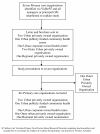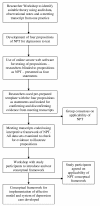Embedding effective depression care: using theory for primary care organisational and systems change
- PMID: 20687962
- PMCID: PMC2925331
- DOI: 10.1186/1748-5908-5-62
Embedding effective depression care: using theory for primary care organisational and systems change
Abstract
Background: Depression and related disorders represent a significant part of general practitioners (GPs) daily work. Implementing the evidence about what works for depression care into routine practice presents a challenge for researchers and service designers. The emerging consensus is that the transfer of efficacious interventions into routine practice is strongly linked to how well the interventions are based upon theory and take into account the contextual factors of the setting into which they are to be transferred. We set out to develop a conceptual framework to guide change and the implementation of best practice depression care in the primary care setting.
Methods: We used a mixed method, observational approach to gather data about routine depression care in a range of primary care settings via: audit of electronic health records; observation of routine clinical care; and structured, facilitated whole of organisation meetings. Audit data were summarised using simple descriptive statistics. Observational data were collected using field notes. Organisational meetings were audio taped and transcribed. All the data sets were grouped, by organisation, and considered as a whole case. Normalisation Process Theory (NPT) was identified as an analytical theory to guide the conceptual framework development.
Results: Five privately owned primary care organisations (general practices) and one community health centre took part over the course of 18 months. We successfully developed a conceptual framework for implementing an effective model of depression care based on the four constructs of NPT: coherence, which proposes that depression work requires the conceptualisation of boundaries of who is depressed and who is not depressed and techniques for dealing with diffuseness; cognitive participation, which proposes that depression work requires engagement with a shared set of techniques that deal with depression as a health problem; collective action, which proposes that agreement is reached about how care is organised; and reflexive monitoring, which proposes that depression work requires agreement about how depression work will be monitored at the patient and practice level. We describe how these constructs can be used to guide the design and implementation of effective depression care in a way that can take account of contextual differences.
Conclusions: Ideas about what is required for an effective model and system of depression care in primary care need to be accompanied by theoretically informed frameworks that consider how these can be implemented. The conceptual framework we have presented can be used to guide organisational and system change to develop common language around each construct between policy makers, service users, professionals, and researchers. This shared understanding across groups is fundamental to the effective implementation of change in primary care for depression.
Figures
Similar articles
-
The Effectiveness of Integrated Care Pathways for Adults and Children in Health Care Settings: A Systematic Review.JBI Libr Syst Rev. 2009;7(3):80-129. doi: 10.11124/01938924-200907030-00001. JBI Libr Syst Rev. 2009. PMID: 27820426
-
The future of Cochrane Neonatal.Early Hum Dev. 2020 Nov;150:105191. doi: 10.1016/j.earlhumdev.2020.105191. Epub 2020 Sep 12. Early Hum Dev. 2020. PMID: 33036834
-
Facilitating professional liaison in collaborative care for depression in UK primary care; a qualitative study utilising normalisation process theory.BMC Fam Pract. 2014 May 1;15:78. doi: 10.1186/1471-2296-15-78. BMC Fam Pract. 2014. PMID: 24885746 Free PMC article.
-
Identifying models of care to improve outcomes for older people with urgent care needs: a mixed methods approach to develop a system dynamics model.Health Soc Care Deliv Res. 2023 Sep;11(14):1-183. doi: 10.3310/NLCT5104. Health Soc Care Deliv Res. 2023. PMID: 37830206 Review.
-
Identifying organisational principles and management practices important to the quality of health care services for chronic conditions.Dan Med J. 2012 Feb;59(2):B4387. Dan Med J. 2012. PMID: 22293057 Review.
Cited by
-
Talking about depression: a qualitative study of barriers to managing depression in people with long term conditions in primary care.BMC Fam Pract. 2011 Mar 22;12:10. doi: 10.1186/1471-2296-12-10. BMC Fam Pract. 2011. PMID: 21426542 Free PMC article.
-
A case of misalignment: the perspectives of local and national decision-makers on the implementation of psychological treatment by telephone in the Improving Access to Psychological Therapies Service.BMC Health Serv Res. 2019 Dec 26;19(1):997. doi: 10.1186/s12913-019-4824-4. BMC Health Serv Res. 2019. PMID: 31878923 Free PMC article.
-
Enablers and barriers to implementing collaborative care for anxiety and depression: a systematic qualitative review.Implement Sci. 2016 Dec 28;11(1):165. doi: 10.1186/s13012-016-0519-y. Implement Sci. 2016. PMID: 28031028 Free PMC article.
-
A qualitative study on general practitioners' perspectives on late-life depression in Singapore-part I: patient presentations and behaviours.Lancet Reg Health West Pac. 2024 Aug 12;51:101170. doi: 10.1016/j.lanwpc.2024.101170. eCollection 2024 Oct. Lancet Reg Health West Pac. 2024. PMID: 39229335 Free PMC article.
-
Applying normalization process theory to understand implementation of a family violence screening and care model in maternal and child health nursing practice: a mixed method process evaluation of a randomised controlled trial.Implement Sci. 2015 Mar 28;10:39. doi: 10.1186/s13012-015-0230-4. Implement Sci. 2015. PMID: 25890352 Free PMC article.
References
-
- WHO. The World Health Report 2001 - Mental Health: New Understanding, New Hope. Geneva: World Health Organisation; 2001.
-
- Katon W, VonKorff M, Lin E, Simon G, Walker E, Bush T, Ludman E. Collaborative management to achieve depression treatment guidelines. Journal of Clinical Psychiatry. 1997;58:20–3. - PubMed
LinkOut - more resources
Full Text Sources





